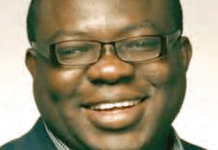See

“What drives me each day is the firm belief that the existence of health inequalities is not a given – it is within our reach to eliminate inequitable access to care if we work collectively to improve the lives and conditions of the most disadvantaged among us.” – Prof. Ibrahim Abubakar
In August 2023, the Institute for Health Metrics and Evaluation (IHME) at the University of Washington’s School of Medicine, announced Prof. Ibrahim Abubakar as winner of the prestigious Roux Prize for 2023. The award, which celebrates individuals who have used evidence-based data to improve population health, recognised Abubakar for his work over the last 30 years to improve global health outcomes. He received a $100,000 reward to reinforce his efforts to support health systems in Nigeria and Africa’s Sahel region.
Highlighting the factors that qualified Abubakar for the remarkable honour, Dr Christopher Murray, Director of IHME, said: “Prof. Abubakar has been steadfast in his contributions to global health. His expertise and advocacy have directly affected policy implementation and the lives of millions of people. Prof. Abubakar embodies exactly what the Roux Prize represents: innovation, ambition, collaboration. The world of public health is a stronger place because of his ongoing contributions and commitment to change.”
Among the many notable contributions of Abubakar in advancing global health, organisers of the Roux Prize highlighted his recent ground-breaking work on The Lancet Nigeria Commission. The Lancet Nigeria Commission (a part of the global Lancet Commissions) is a multidisciplinary group of Nigerian academics from around the world, working in close collaboration with University College London’s Institute for Global Health, to drive better health policies for Nigerians through evidence-based data.
Leading this high-powered team, Abubakar, in March 2022, completed and presented a comprehensive analysis of Nigeria’s health system, supported by Global Burden of Disease (GBD) data. The research identified critical gaps and offered specific recommendations on innovation financing and specific interventions to improve healthcare staffing, information systems, and access to care for all.
Radical reforms
One of the landmark recommendations made by the Abubakar-led team was the provision of health insurance coverage for 83 million poor Nigerians unable to pay insurance premiums. According to the report, “This could be attained by using innovative financing through targeted levies and mandatory insurance, a ring-fenced budget, and reform of the regulatory landscape to harness the market potential of the private sector.”
It was in response to the Abubakar-led recommendations that the immediate past President of Nigeria, Muhammadu Buhari, signed the National Health Insurance Authority Bill 2022 into law. The new law, according to a statement by the then Senior Special Assistant to the President on Media and Publicity, Mallam Garba Shehu, repealed the National Health Insurance Scheme (NHIS) Act of 2004. At the signing of the new law, Buhari specifically announced that a Fund would be set up “to ensure coverage of 83 million poor Nigerians who cannot afford to pay premiums as recommended by the Lancet Nigeria Commission.”
It is noteworthy that prior to the Abubakar-driven intervention, less than 5 per cent of Nigeria’s over 200 million people were covered under the now defunct NHIS,.
Chronicles of impact
As noted earlier, the remarkable transformation in the Nigerian health system was just one of the numerous impacts that Prof. Abubakar has orchestrated in global health in the course of his meritorious career. It was his studies on global migration that helped launch the United Nations Global Compact on Migration, the first intergovernmental agreement that seeks to find a common approach to managing international migration. His efforts have also led to such policy changes as the guidelines for the treatment of latent tuberculosis and the commissioning of mobile screening for tuberculosis in the United Kingdom and Romania.
Indeed, so massive and widespread are Abubakar’s contributions to global health outcomes that The Lancet, one of the world’s oldest and highest-impact medical journals, described him as “a global health diplomat”. Similarly, following his appointment as dean of the Faculty of Population Health Sciences, UCL, in 2021, the Nigerians in Diaspora Commission (NIDCOM) named him “the Diasporan of the Moment”. A statement from the Commission said, “He has contributed greatly to public health institutions, including achieving results in the area of communicable disease in the country.” President Buhari equally thanked him for the unflinching support he had provided to public health institutions in Nigeria to achieve tangible results in the area of control and prevention of communicable diseases.
Abubakar is a professor of Infectious Disease Epidemiology at UCL. Aside from his prominent role as dean of Faculty of Population Health Sciences, he is also UCL’s pro-provost (Health), the very first person to assume the position in the nearly 200-year history of the institution. In this historic role, which he assumed in December 2023, Abubakar provides additional senior academic leadership for UCL’s work with its health partners, becoming the senior point of connection for UCL’s wide range of health partners, in coordination with the institution’s faculties. He also leads the development of UCL’s health strategy, provides leadership to the Health Partnership team, and advises the University Management Committee on its relationship with the wider health system.
Having begun his UCL career in 2012, as professor of Infectious Disease Epidemiology, Abubakar has occupied other significant roles in the institution between then and now. He was the director of the Institute of Global Health, from 2016 to 2021. He also served as vice dean, Internal and External Engagement, Faculty of Population Health Sciences.
Background and career exploits
Abubakar was born and raised in Bauchi, northern Nigeria. Even though his family was relatively privileged, his early years saw him witnessing huge disparities in medical outcomes all around him. These inequalities were caused partly by socio-economic factors and partly by gross deficiencies in the health system itself.
These observations, coupled with the circumstances surrounding his father’s premature death in the 70s, propelled Abubakar to study Medicine. He obtained his medical degree from Ahmadu Bello University, Zaria, in 1992. However, as he began to practise (mainly at Ahmadu Bello University Teaching Hospital), it dawned on him that he needed to specialise to make the impact he desired.
According to him, “I originally trained in medicine and took an interest in general Internal Medicine and Infectious Disease Medicine. I continued to notice great disparities in people’s health outcomes, though, which made me realise that—in addition to clinical training—I needed to look at health in a different way.”
That realisation made him proceed to the London School of Hygiene and Tropical Medicine, University of London, graduating with an MSc in Public Health/International Health in 1999. He undertook further training in public health at the University of Cambridge before obtaining his PhD in Epidemiology from the University of East Anglia.
Abubakar affirms that these additional qualifications gave him the disciplinary expertise to more effectively tackle challenges in biomedicine and the wider determinants of health and inequalities. Over the last three decades, his career has spanned leadership roles in clinical, academic and public service work. Prior to his accomplishments at UCL, he served as professor in Health Protection at the Norwich Medical School, Norwich, UK. He also served as head of TB at Public Health England, where he led the UK government’s successful strategy to control TB. In addition to advising the UK Department of Health on tuberculosis control, he also headed the WHO Europe TB Elimination Plan advisory Group.
During the COVID-19 epidemic, Abubakar served as scientific adviser to the House of Lords Science and Technology Select Committee – Science of COVID-19 Review. He also served as scientific and technical adviser to the Nigerian Presidential Task Force on COVID-19. He was formerly chairman of the WHO’s Strategic and Technical Advisory Group on Tuberculosis and the WHO Clinical Trials Forum.
Abubakar led the UCL-Lancet Commission on Migration and Health, which dispelled myths regarding the perceived threat from migration to public health and urged action on improved health provision for migrants. The findings of the commission achieved global coverage in the media. He also co-edited the Oxford Specialist Handbook in Infectious Disease Epidemiology published in 2016.
In addition to the various honours and recognitions he has received, Prof. Abubakar is a Fellow of the Royal College of Physicians, as well as the UK Academy of Medical Sciences.










